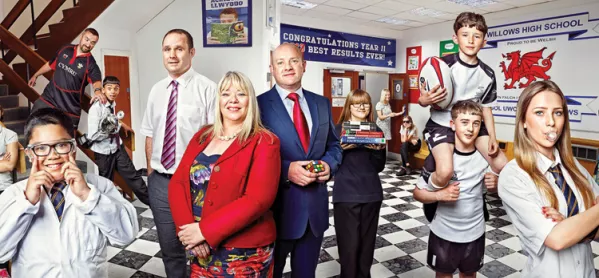I remember once being told a story by an unnamed family friend. Post-university, he responded to an advert in a paper to work at a world-renowned publishing company. He arrived at an interview and waited for 30 minutes before being met by the manager, who explained that no other interviewees had turned up and then asked when he could start. I also read somewhere that Christopher Hitchens became a journalist because that was all he could do with a third-class degree. Popular culture is full of examples of a certain post-war generation, from all backgrounds, achieving remarkable things after fairly unremarkable starts to their education.
Have I digressed from my weekly round-up of what is happening at Willows? Only slightly - I wanted to highlight how much the importance of education has changed for young people. Can you imagine a student in 2015 deciding to become a journalist because their results were disappointing? Results have become so much more important than they have ever been and young people are all too aware of the competitive world around them.
This is the backdrop to Georgia’s story. Georgia’s mental health is an issue that will have resonated with teachers. As a profession, we are increasingly ill-equipped to deal with the complex emotional issues caused by the pressure on young people. The intensity of that pressure from teachers and parents, who are equally aware of the consequences of underachievement, not to mention the media and peers, can be overwhelming and have dire consequences. Her breakdown in her mock GCSE (surely not a real examination, since rules were being ignored left, right and centre) was unsurprising because such occurrences is so common up and down the country.
Once again, the Educating... series has done what it does best: tackling the serious issues faced by schools with humanity and compassion - but without pulling any punches. The mental well-being of young people needs to be at the forefront of British education policy. Everyone who works in schools will be able to see that cases of anxiety, depression and self-harm (to name but a few of the mental health issues out there) are more apparent than ever. Either this is because of greater awareness of this problem or an increase in the intense pressure felt by students affecting their mental well-being - probably a bit of both.
What was reassuring to see was Miss Priday’s support for Georgia. She seemed caring and wise in a situation when far too many (myself included) might panic. It is hard for those who have a lack of understanding of mental health to be prepared for the shock of seeing someone who has self-harmed. Miss Priday took it in her stride. The parents of the pupils of Willows must be greatly reassured that staff like her are in charge of their children’s care every day.
The film-makers and the staff at Willows should be proud for shining the spotlight on mental health issues in school and I think Georgia was incredibly brave to allow her problems to be aired. The country is a better place for it.
The light relief in last night’s episode was provided by George and Erin. A clever, charismatic boy from the wrong side of the tracks. A female model student who puts him on the right track. It’s the stuff of Hollywood legend (with the addition of sometimes incomprehensible Welsh accents). I have to admit to having mixed feelings about this storyline. When I see 13-year-olds talking about relationships on television, I get the temptation to throw heavy things at the screen. Why do teenagers do it to themselves? On the other hand, I found it all very compelling viewing.
I, like George, did drama at school and I, too, did it for similar reasons (at a boys’ school, it was the only joint activity we did with the girls’ schools across the road). I think my disdain for teenagers wanting to grow up too quickly comes from the fact I was the same. Either way, Mr Ritter seemed to benefit from having a helping hand in the production and it appeared Erin was a positive influence on George, so it can’t be all bad. The importance of results may have changed, but the story of teenage romance - that remains all too uncomfortably familiar.
